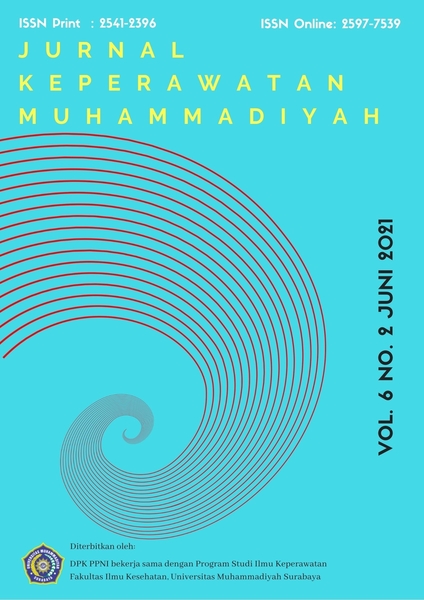Pengaruh Hipnosis Terhadap Kecemasan Pada Calon Akseptor KB IUD
DOI:
https://doi.org/10.30651/jkm.v6i2.17395Kata Kunci:
anxiety, hypnosis, IUDAbstrak
Objective: Anxiety about the installation procedure is an obstacle experienced by prospective acceptors of the IUD method. One way to reduce anxiety is to use hypnotherapy techniques. This study aims to determine the effect of hypnotherapy on the anxiety of prospective IUD family planning acceptors.
Methods: This research was a quasi-experimental study with a one-group pre-test and post-test approach without a control group. This research was carried out at TPMB Farida Hajri in January - March 2021. The population under study consisted of up to 40 candidate IUD acceptors. Anxiety was measured using the Hamilton Anxiety Rating Scale (HARS). Test data were analyzed using Wilcoxon.
Results: There was a decrease in the anxiety level of prospective IUD acceptors before and after receiving non-pharmacological hypnotherapy by 10.8 points. Based on the calculation results of the Wilcoxon signed rank test, a Z value of -6.145 was obtained with a significance value of < 0.000 (p < 0.05), which was a significant difference before and after the intervention.
Conclusion: There are differences in the level of anxiety before and after receiving non-pharmacological therapy in the form of hypnotherapy intervention. Anxiety in family planning acceptors is something that needs to be considered because it can cause an increase in pain scores in IUD acceptors. Based on the results of this study, it is necessary to manage anxiety to increase comfort in inserting the IUD so that it was expected to increase the coverage of contraceptive use, especially IUD contraception.
Referensi
Akdemir, Y., & Karadeniz, M. (2019). The relationship between pain at IUD insertion and negative perceptions, anxiety and previous mode of delivery. The European Journal of Contraception & Reproductive Health Care, 24(3), 240–245.
Akdemir, Y., & Karadeniz, M. (2020). A psychological factor associated with pain during intrauterine device insertion: emotional reactivity. Clinical and Experimental Obstetrics & Gynecology, 47(3), 335–340.
Bainuan, L. D. (2017). Tingkat pendidikan dan pekerjaan ibu dalam pemilihan kontrasepsi iud. Midwifery Journal of Akbid Griya Husada Surabaya, 4(1), 25.
DS, A. I., & Kristiyawati, S. P. (2014). Pengaruh Hipnoterapi terhadap Penurunan Tingkat Kecemasan pada Pasien yang Menjalani Kemoterapi Di RS Telogorejo Semarang. Karya Ilmiah.
Fathi, F., Janbabai, G., & Pourasghar, M. (2019). Efficiency of Hypnotherapy on Reducing Pain and Death Anxiety, and Increasing Resilience and Improvement of Cancer Cells in Patients with Acute Myeloid Leukemia. Journal of Mazandaran University of Medical Sciences, 28(168), 133–149.
Fitriyani, M. (2016). Hipnosis Go: Untuk Hidup Lebih Baik. Bintangwahyu.
Juniarti, H., Rizona, F., & Hikayati, H. (2019). PENGARUH FIVE FINGERS TECHNIQUE TERHADAP KECEMASAN PASIEN KANKER PAYUDARA YANG MENJALANI KEMOTERAPI DI RUMAH SAKIT UMUM PUSAT DR. MOHAMMAD HOESIN. Proceeding Seminar Nasional Keperawatan, 5(1), 162–167.
La Kahija, Y. F. (n.d.). HansC-02_Hipnoterapi: Prinsip-Prinsip Dasar Praktik Psikoterapi.
Maulana, H. D. J., & Sos, S. (2009). Promosi kesehatan.
Nurgiwiati, E. (2015). Terapi alternatif dan komplementer dalam bidang keperawatan. Bogor: In Media.
Plaskota, M., Lucas, C., Evans, R., Pizzoferro, K., Saini, T., & Cook, K. (2012). A hypnotherapy intervention for the treatment of anxiety in patients with cancer receiving palliative care. International Journal of Palliative Nursing, 18(2), 69–75.
Purbaningrum, P. (2018). Perbandingan Regresi Logistik Model Logit dan Model Probit Untuk Analisis Penggunaan Alat Kontrasepsi (Analisis Prediktor Rendahnya Penggunaan Kontrasepsi IUD di Indonesia Tahun 2015). Universitas Airlangga.
Purwanto, T., & Riyadi, S. (2009). Asuhan Keperawatan Jiwa. Yogyakarta: Graha Ilmu.
Unduhan
Diterbitkan
Terbitan
Bagian
Lisensi
- Penulis tetap memegang hak atas karyanya dan memberikan hak publikasi pertama kepada jurnal ini yang secara simultan karya tersebut dilisensikan di bawah:Â Creative Commons Attribution-ShareAlike 4.0 International (CC BY-SA 4.0)













